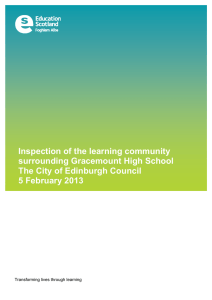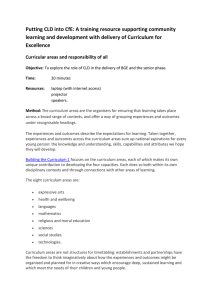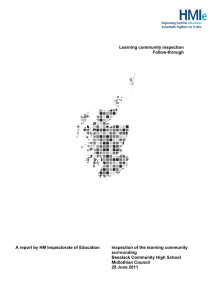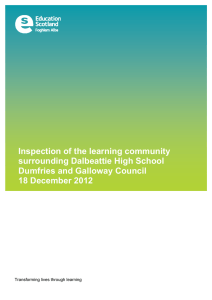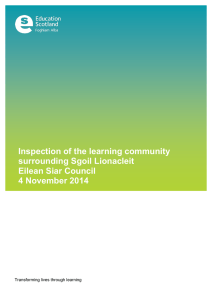Inspection of the learning community surrounding Trinity Academy
advertisement
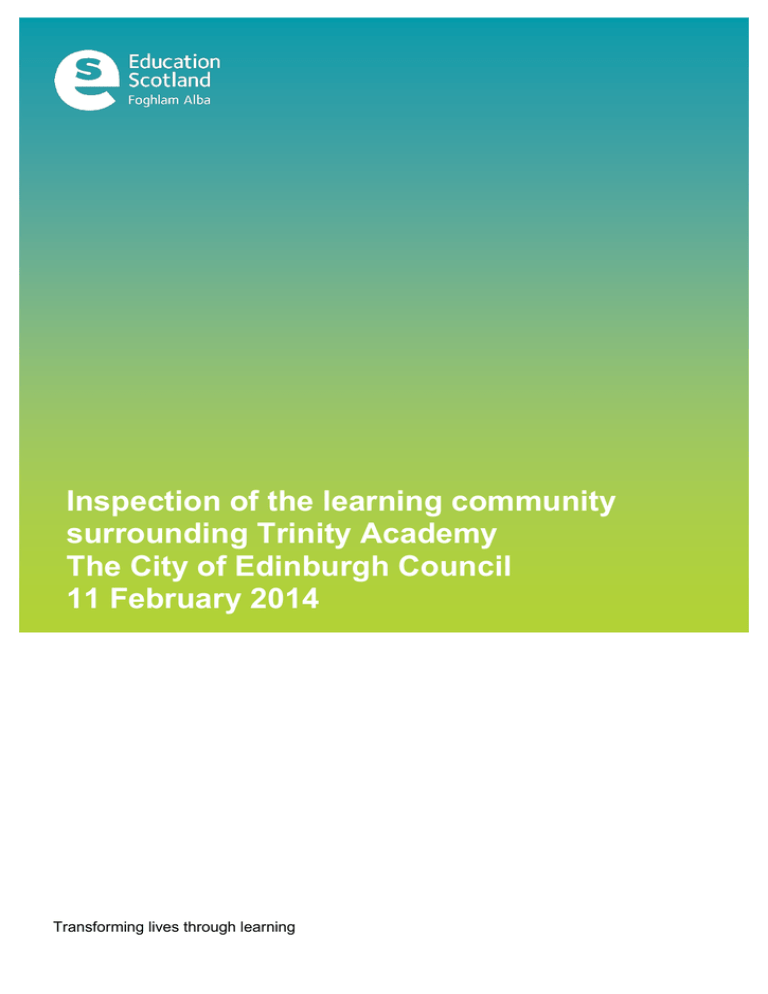
Inspection of the learning community surrounding Trinity Academy The City of Edinburgh Council 11 February 2014 Transforming lives through learning 1. Context Community learning and development (CLD) partners within the area of Trinity Academy were inspected by Education Scotland during December 2013. During the visit Education Scotland staff talked to children, young people and adults. We worked closely with local CLD managers, CLD providers, partners, paid staff and volunteers. We wanted to find out how well partners are improving the life chances of people living in the community through learning, building stronger more resilient communities and improving the quality of services and provision. We also looked at how well, paid staff and volunteers are developing their own practices and how well partners, including schools are working together. We looked at some particular aspects of recent work which were identified by partners including: early intervention and family learning programmes; supporting young people through their transition into positive destinations; and partnership approaches with the school. 2. How well are partners improving learning, increasing life chances, promoting and securing wellbeing? CLD partners are working well together and increasing their focus on early intervention and prevention. Work with parents and family learning programmes are improving life chances and securing wellbeing. Partners including early years staff, health visitors and midwives are working in partnership to promote health literacy. The Pregnancy Café, part of the Bumpstart programme, is supporting parents very effectively and promoting peer support. Parents involved in a wide range of family learning programmes are feeling less isolated and have been able to access other learning opportunities in the community. Parents participating in a scrapbook programme are building better relationships with their children, developing literacy skills and supporting them in their learning. CLD partners are coordinating and delivering high quality and effective programmes for children and young people and are making progress in linking these to national Curriculum for Excellence guidance. Programmes are increasingly targeted to ensure that health and wellbeing and employability are improving. The Junction is helping young people make positive choices in their lives through providing access to accessible support, counselling and advice. Granton Youth Centre, in partnership with others, builds positive and trusting relationships with the young people they engage with through Streetwork programmes. The Citadel Youth Centre provides a wide range of effective programmes including a Young Mums Group. Young women are continuing to engage in learning and are building their employability skills. They are developing skills in peer mentoring and providing support and encouragement to each other. The Citadel Youth Centre provides a very effective volunteer programme that is helping young people to make a positive contribution to their communities and progress onto further training and employment. Partners are working well together to support young people into positive post school destinations through the 16+ Coordinating Group. The number of young people accessing positive destinations is increasing with many benefiting from Activity 1 Agreements at the Citadel Hub. Young people are achieving, developing their life skills and contributing more effectively to their communities as a result of their participation in Activity Agreements. Young people participating in a range of programmes are accessing and achieving success in accredited programmes including The Duke of Edinburgh’s Award, Dynamic Youth Awards and Saltire Awards. The uniformed organisations provide very good opportunities for young people in the area, developing their life skills and promoting achievement. Partnership with the secondary school includes effective support for those young people facing barriers in their learning. The Jobs, Education and Training (JET) programme offers an identified group of young people flexible pathways which are leading to employment. CLD partners recognise that partnership approaches to Curriculum for Excellence could be further developed to support young people in their learning, particularly in planning for their post school transition. Although accredited opportunities are increasing, CLD partners do not gather or share information on young people’s achievements across the learning community. A range of adult learning opportunities is provided through the Leith Adult Learning Network. English for speakers of other languages (ESOL) provision offers a range of programmes including family learning. Learners are becoming more engaged in their children’s learning and are better able to support their children in their transition to primary school. Within the learning community, community organisations are shaping and delivering local services. They are becoming more actively involved in important decisions regarding budgeting and grants through Leith Decides, a neighbourhood partnership initiative. The Trinity Community Council plays an important role in the local community involving local adults and young people in work to improve local parks and community gardens. Wardie Residents Association deliver a range of sports and recreational activities that are inclusive of older people. This is supporting their health and wellbeing and reducing social isolation. Fort Community Centre Management Committee are working towards gaining a gold award as a Health Promoting Centre. They work well with the neighbouring early years centre to promote a wide range of opportunities for children and families. There have been significant changes to housing in the local area and local community planning would be further supported by a clearer identification of local needs. The Neighbourhood Partnership structure provides good opportunities for further engagement of local people in decision making and increasing their influence in local community planning developments. CLD partners need to look at how they can provide effective training and support to maximise their contribution. The use of information and communications technology is under developed and could help enhance learning and support particularly in relation to the impact of Welfare Reform. The gathering of performance data does not fully capture the impact of partnership working across the learning community. This makes it difficult for partners to plan for improvement and assess trends. 2 3. How well are partners working together and improving the quality of services and provision? Services are beginning to integrate well in the delivery of programmes for parents and families. Partnership agreements are leading to better joint planning and shared self-evaluation in family learning programmes. Locality planning structures including the Neighbourhood Partnership and North Children’s Services Management Group (CSMG) are supporting the delivery of community planning priorities. The CSMG has delivered important multi-agency training in Getting it right for every child (GIRFEC) which has supported CLD partners to develop this approach in their work. Staff and volunteers across the learning community are highly skilled and able to access a range of high-quality professional learning opportunities. The training delivered on the impact of parental alcohol misuse provides a good example of multi-agency training which has had a positive impact in improving awareness and practice. Partnership networks including the local youth services network are strengthening joint working, coordination of provision and identification of training needs to improve practice. All partners demonstrate a strong commitment to tackling inequality and closing the opportunity gap in their work. Approaches to self-evaluation are embedded in the practice of almost all staff and volunteers. Participants are actively engaged in self-evaluation processes through a range of methods including the effective use of social media. CLD partners now need to look at how they can develop further joint approaches to planning, self-evaluation and supporting improvement. The LOMIS management information system is used well by local authority CLD staff but this does not fully capture the impact of partnership working in improving life chances and securing wellbeing across the learning community. This inspection of learning and development in the learning community surrounding Trinity Academy found the following key strengths. Partnerships that are improving the life chances of children, young people and families. Clear focus on improving health and wellbeing and employability. Early years and family learning programmes. Partnership approaches supporting young people into positive destinations. Active and vibrant community organisations who are influencing, designing and delivering local services. Highly skilled and motivated staff and volunteers making a real difference to improving lives and communities. We discussed with partners how they might continue to improve their work. This is what we agreed with them. Improve approaches to gathering and making use of performance data across partners. Enhance partnership working and sharing information across CLD partners and the school to further support young people achieve success. Strengthen the influence of the community, including young people in local and wider decision making. 3 Build on approaches to joint planning and shared self-evaluation across partners. 4. What happens at the end of the inspection? The inspection team was able to rely on the high quality self-evaluation provided by the learning community. Partners have a good understanding of their strengths and areas for improvement and communities are achieving well. As a result we have ended the inspection process at this stage. Anne Gibson HM Inspector 11 February 2014 4 Additional inspection evidence, such as details of the quality indicator evaluations, for this learning community can be found on the Education Scotland website at http://www.educationscotland.gov.uk/inspectionandreview/reports/othersectors/com munitylearninganddevelopment/TrinityAcademyLCEdinburgh.asp. If you would like to receive this report in a different format, for example, in a translation you can contact the administration team on 01506 600381. If you want to give us feedback or make a complaint about our work, please contact us by telephone on 0141 282 5000, or e-mail: complaints@educationscotland.gsi.gov.uk or write to us, addressing your letter to The Complaints Manager, Denholm House, Almondvale Business Park, Livingston, EH54 6GA. Text phone users can contact us on 01506 600 236. This is a service for deaf users. Please do not use this number for voice calls as the line will not connect you to a member of staff. Crown Copyright 2014. Education Scotland 5

